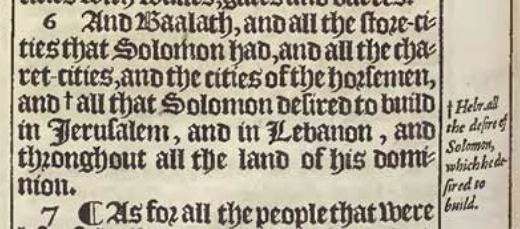Hi Will Kinney,
I am still trying to find somewhere to buy a 100% inerrant Bible. Without a date on it or a version number it is hard to be sure. I was horrified to learn that even Cambridge Bibles aren't the same as they were just a few years ago. Have a look at
this: I checked my 1885 Bible and it doesn't have any of the changes listed in this article so it could be the authentic one, could it? Maybe you should check your own Bible and see if it passes the test?
Having said that, my Bible doesn't have the bit at the beginning with the pretty picture and the notes from the translators. It just starts with Genesis 1.
I know a lot of people keep talking about the Cambridge 1769 version as the final 100% inerrant version but when I looked this up on
Wikipedia it said:
By the mid-18th century the wide variation in the various modernized printed texts of the Authorized Version, combined with the notorious accumulation of misprints, had reached the proportion of a scandal, and the Universities of Oxford and Cambridge both sought to produce an updated standard text. First of the two was the Cambridge edition of 1760, the culmination of twenty-years work by
Francis Sawyer Parris,
[92] who died in May of that year. This 1760 edition was reprinted without change in 1762
[93] and in
John Baskerville's fine folio edition of 1763.
[94] This was effectively
superseded by the 1769 Oxford edition, edited by Benjamin Blayney,[95] though with comparatively few changes from Parris's edition; but which
became the Oxford standard text, and is reproduced almost unchanged in most current printings.
I've bolded the relevant parts. So it seems that the Cambridge 1769 version is really the Cambridge 1760 version with a few changes and called the Oxford 1769 edition. Confusing, I know, but you are the expert so I presume you know which is which.
There is one thing that bothers me a lot and that is the words 'almost unchanged' in the bolded part above. Can you tell me if Cambridge are in the habit of making small changes here and there in their undated KJV texts? I mean surely, that would mean it was no longer 100% inerrant, wouldn't it?
I am hoping you can sort this out for me because I would be bitterly disappointed if it turned out that Cambridge are changing the text of the Bible without telling anyone.
In a similar vein, the Wiki article says
By the mid-19th century, almost all printings of the Authorized Version were derived from the 1769 Oxford text
This is comforting in a way because it means there is a gold standard readily available. But it all goes sour when they say 'derived from'. And I am sure you know that you only need a tiny amount of sour milk to make the whole urn sour.
It then says:
By the early twentieth century, editing had been completed in Cambridge's text, with at least 6 new changes since 1769, and the reversing of at least 30 of the standard Oxford readings.
I must admit, this makes me feel even more special as it seems that it was only in the 20th century that anyone had a 100% inerrant Bible. Although, a thought occurs to me that perhaps all these different versions were inerrant and that whatever CUP produce, it is automatically guaranteed to be 100% inerrant simply because CUP are God's divine instrument for inerrancy. So even though the versions might change, they are still inerrant. In other words inerrant just means whatever CUP Bible is current? Would you have an opinion on this idea? I know it sounds a bit zany, but how else am I to make sense of it? Look at this for example:
Cambridge University Press introduced a change at
1 John 5:8 in 1985, reversing its longstanding tradition of printing the word "spirit" in lower case by using a capital letter "S".
[116] A Rev. Hardin of Bedford, Pennsylvania, wrote a letter to Cambridge inquiring about this verse, and subsequently received a reply from Dr. Cooper on June 3, 1985, admitting that it was a "matter of some embarrassment regarding the lower case 's' in Spirit".
This would mean that if I went out and bought a Cambridge Bible, it would not be the same as your one. Please, Will, can you give me a detailed and clear answer to these concerns and my last post. I am relying on you as the expert to clear it all up.

